Authors & editors
ANU Press has collaborated with a diverse range of authors and editors across a wide variety of academic disciplines. Browse the ANU Press collection by author or editor.

East Asia Forum Quarterly: Volume 1, Number 2, 2009 »
Publication date: November 2009
East Asia Forum Quarterly grew out of East Asia Forum (EAF) online, which has developed a reputation for providing a platform for the best in Asian analysis, research and policy comment on the Asia Pacific region in world affairs. EAFQ aims to provide a further window onto research in the leading research institutes in Asia and to provide expert comment on current developments within the region. The East Asia Forum Quarterly, like East Asia Forum online, is an initiative of the East Asia Forum (EAF) and its host organisation, the East Asian Bureau of Economic Research (EABER) in the Crawford School of Economics and Government in the College of Asia & the Pacific at The Australian National University.
Download for free
Not available for purchase

One World—Many Paths to Peace »
Edited by: Venerable Alex Bruce
Publication date: November 2009
In June 2007, The Australian National University’s College of Law hosted an extraordinary symposium in Canberra of religious leaders to discuss the issue of religion and world peace. In a world torn by violence and intolerance in the name of religion, the visit to Australia of His Holiness the Dalai Lama represented an ideal opportunity to bring together representatives of the Buddhist, Christian, Islamic and Jewish traditions to further the fundamental message that the world’s religions are really causes for peace and harmony. In the presence of His Holiness the Dalai Lama, representatives of the Christian, Jewish and Islamic spiritual traditions explained why their respective traditions embodied the highest ideals of wisdom and compassion and thus were not the principal cause of war and dissention within society. As part of that process, this volume includes chapters that explain the basic tenets of Christianity, Buddhism, Islam and Judaism. Experts in their fields have written these chapters for the sole purpose of presenting their spiritual tradition in as transparent and accessible a form as possible

The Architecture of Security in the Asia-Pacific »
Edited by: Ron Huisken
Publication date: October 2009
We cannot expect in East Asia over the foreseeable future to see the sort of conflation of sovereign states that has occurred in Europe. We must anticipate that, for the foreseeable future, the requirement will be for the sensible management and containment of competitive instincts.
The establishment of a multilateral security body in East Asia that includes all the key players, and which the major powers invest with the authority to tackle the shaping of the regional security order, remains a critical piece of unfinished business.

Timing is Everything »
The Politics and Processes of New Zealand Defence Acquisition Decision Making
Authored by: Peter Greener
Publication date: October 2009
This book identifies the critical factors that shaped and influenced New Zealand’s defence acquisition decision-making processes from the election of the Fourth Labour Government in 1984 and the subsequent ANZUS crisis, through to the 11 September 2001 terrorist attacks on the United States and the following ‘war on terror’. It explores and analyses decision-making processes in relation to the ANZAC frigates, the military sealift ship HMNZS Charles Upham, the F-16 strike aircraft, the P-3C Orion maritime patrol aircraft upgrade, and the LAV IIIs.

What does the Honeybee See? And how do we Know? »
A critique of scientific reason
Authored by: Adrian Horridge
Publication date: October 2009
This book is the only account of what the bee, as an example of an insect, actually detects with its eyes. Bees detect some visual features such as edges and colours, but there is no sign that they reconstruct patterns or put together features to form objects. Bees detect motion but have no perception of what it is that moves, and certainly they do not recognize “things” by their shapes. Yet they clearly see well enough to fly and find food with a minute brain. Bee vision is therefore relevant to the construction of simple artificial visual systems, for example for mobile robots. The surprising conclusion is that bee vision is adapted to the recognition of places, not things.
In this volume, Adrian Horridge also sets out the curious and contentious history of how bee vision came to be understood, with an account of a century of neglect of old experimental results, errors of interpretation, sharp disagreements, and failures of the scientific method. The design of the experiments and the methods of making inferences from observations are also critically examined, with the conclusion that scientists are often hesitant, imperfect and misleading, ignore the work of others, and fail to consider alternative explanations. The erratic path to understanding makes interesting reading for anyone with an analytical mind who thinks about the methods of science or the engineering of seeing machines.

Cross-sections, The Bruce Hall Academic Journal: Volume V, 2009 »
Publication date: October 2009
Representing the combined energies of a large group of authors, editors, artists and researchers associated with Bruce Hall at the ANU, Cross-sections collects a range of works (from academic articles and essays to photography, digital art and installation artwork) that represents the disciplinary breadth and artistic vitality of the ANU.
Presenting a challenging and absorbing way for students to hone vital research skills, in the process, Cross-sections nurtures a fruitful environment of collaborative interaction between academics and students.
Download for free
Not available for purchase
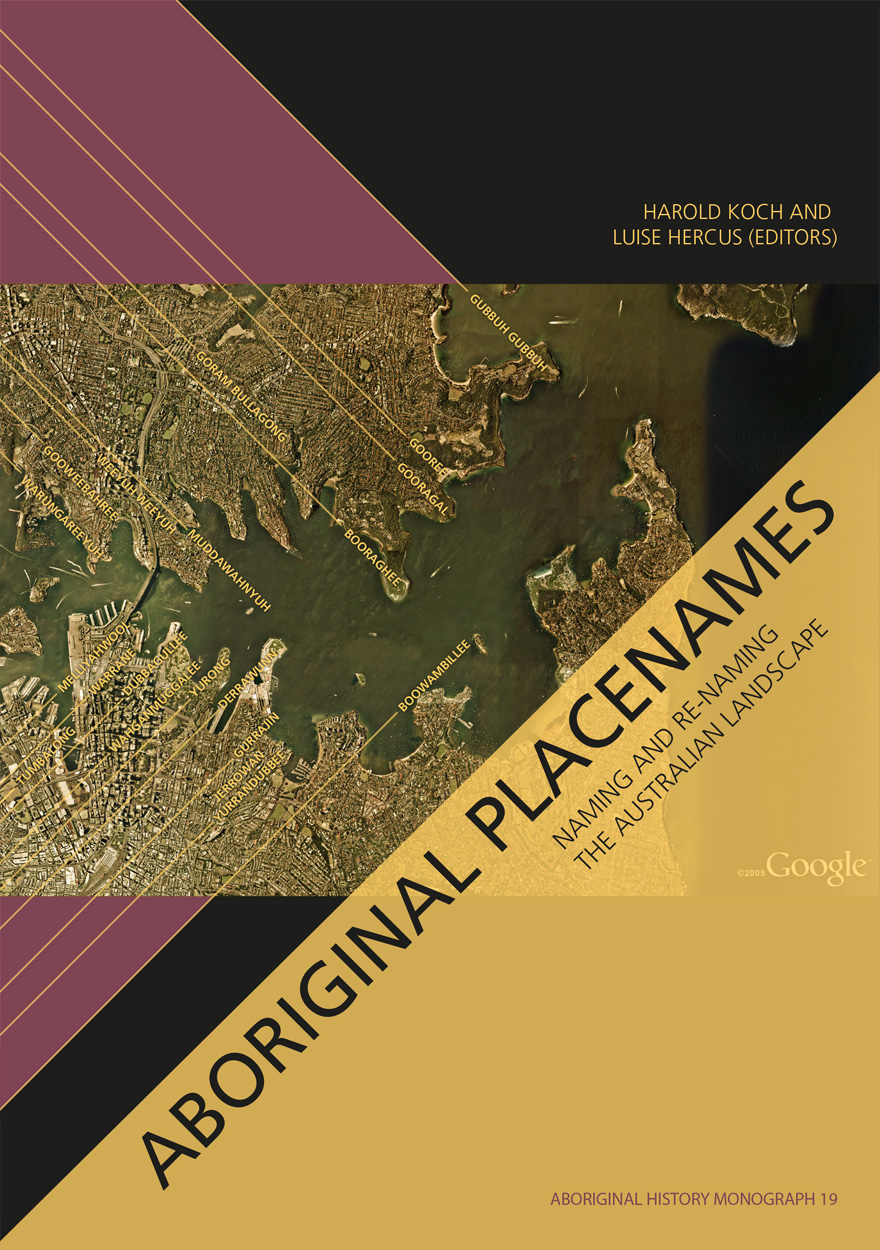
Aboriginal Placenames »
Naming and re-naming the Australian landscape
Edited by: Harold Koch, Luise Hercus
Publication date: October 2009
Aboriginal approaches to the naming of places across Australia differ radically from the official introduced Anglo-Australian system. However, many of these earlier names have been incorporated into contemporary nomenclature, with considerable reinterpretations of their function and form. Recently, state jurisdictions have encouraged the adoption of a greater number of Indigenous names, sometimes alongside the accepted Anglo-Australian terms, around Sydney Harbour, for example. In some cases, the use of an introduced name, such as Gove, has been contested by local Indigenous people.
The 19 studies brought together in this book present an overview of current issues involving Indigenous placenames across the whole of Australia, drawing on the disciplines of geography, linguistics, history, and anthropology. They include meticulous studies of historical records, and perspectives stemming from contemporary Indigenous communities. The book includes a wealth of documentary information on some 400 specific placenames, including those of Sydney Harbour, the Blue Mountains, Canberra, western Victoria, the Lake Eyre district, the Victoria River District, and southwestern Cape York Peninsula.
For more information on Aboriginal History Inc. please visit aboriginalhistory.org.au.

A Bird That Flies With Two Wings »
Kastom and state justice systems in Vanuatu
Authored by: Miranda Forsyth
Publication date: September 2009
This book investigates the problems and possibilities of plural legal orders through an in-depth study of the relationship between the state and customary justice systems in Vanuatu. It argues that there is a need to move away from the current state-centric approach to law reform in the South Pacific region, and instead include all state and non-state legal orders in development strategies and dialogue. The book also presents a typology of models of engagement between state and non-state legal systems, and describes a process for analysing which of these models would be most advantageous for any country in the South Pacific region, and beyond.

Does History Matter? »
Making and debating citizenship, immigration and refugee policy in Australia and New Zealand
Edited by: Klaus Neumann, Gwenda Tavan
Publication date: September 2009
This volume of essays represents the first systematic attempt to explore the use of the past in the making of citizenship and immigration policy in Australia and New Zealand. Focussing on immigration and citizenship policy in Australia and New Zealand, the contributions to this volume explore how history and memory are implicated in policy making and political debate, and what processes of remembering and forgetting are utilised by political leaders when formulating and defending policy decisions. They remind us that a nuanced understanding of the past is fundamental to managing the politics and practicalities of immigration and citizenship in the early 21st century.

Framing the Global Economic Downturn »
Crisis rhetoric and the politics of recessions
Edited by: Paul `t Hart, Karen Tindall
Publication date: September 2009
The global economic downturn that followed the collapse of major US financial institutions is no doubt the most significant crisis of our times. Its effects on corporate and governmental balance sheets have been devastating, as have been its impacts on the employment and well being of tens of millions of citizens. It continues to pose major challenges to national policymakers and institutions around the world.
Managing public uncertainty and anxiety is vital in coping with financial crises. This requires not just prompt action but, most of all, persuasive communication by government leaders. At the same time, the very occurrence of such crises raises acute questions about the effectiveness and robustness of current government policies and institutions. With the stakes being so high, defining and interpreting what is going on, how and why it happened, and what ought to be done now become key questions in the political and policy struggles that crises invariably unleash.
In this volume, we study how heads of government, finance ministers and national bank governors in eight countries as well as the EU engage in such ‘framing contests’, and how their attempts to interpret the cascading events of the economic downturn were publicly received. Using systematic content analysis of speeches and media coverage, this volume offers a unique comparative assessment of public leadership in times of crisis.
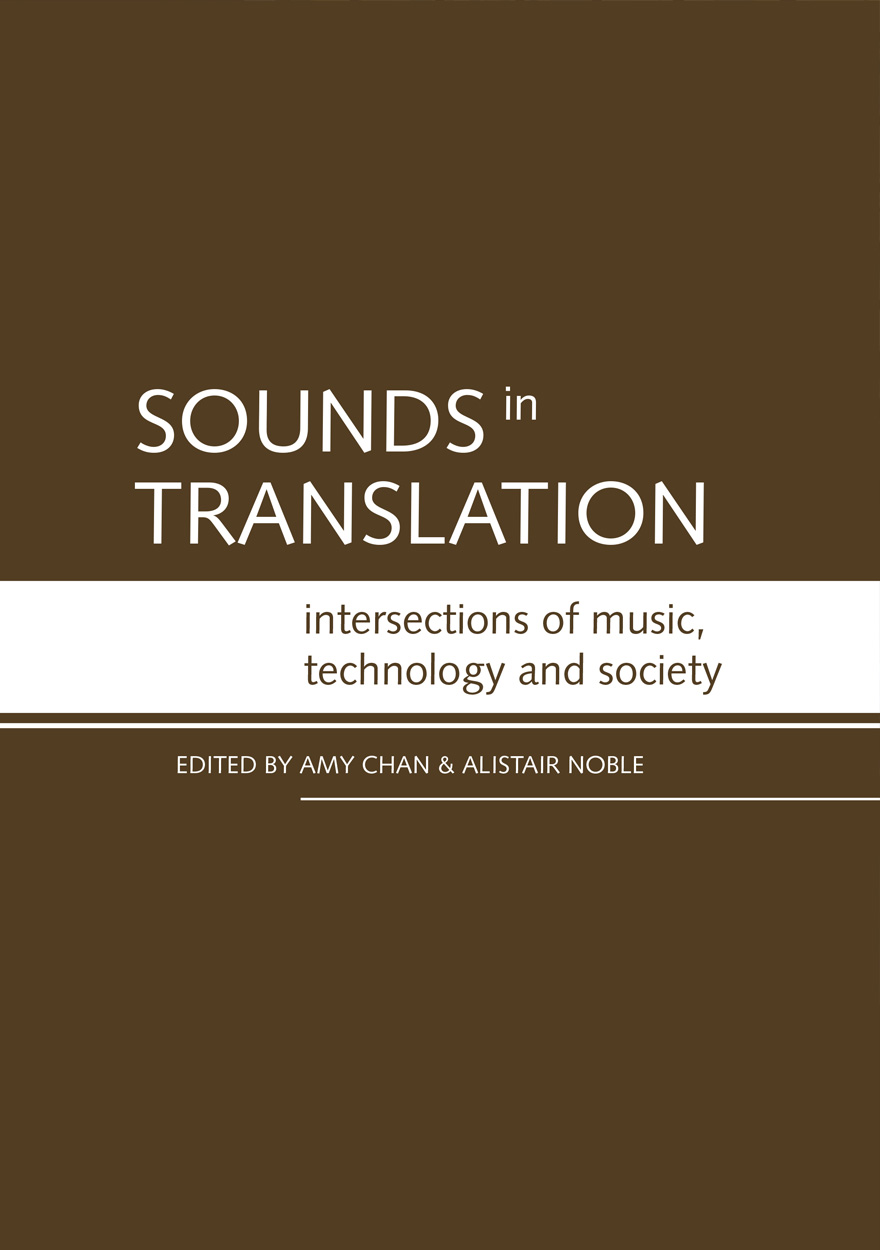
Sounds in Translation »
Intersections of music, technology and society
Edited by: Amy Chan, Alistair Noble
Publication date: September 2009
Sounds in Translation: Intersections of music, technology and society joins a growing number of publications taking up R. Murray Schafer’s challenge to examine and to re-focus attention on the sound dimensions of our human environment. This book takes up his challenge to contemporary audiologists, musicologists and sound artists working within areas of music, cultural studies, media studies and social science to explore the idea of the ‘soundscape’ and to investigate the acoustic environment that we inhabit. It seeks to raise questions regarding the translative process of sound: 1) what happens to sound during the process of transfer and transformation; and 2) what transpires in the process of sound production/expression/performance. Sounds in Translation was conceived to take advantage of new technology and a development in book publishing, the electronic book. Much of what is written in the book is best illustrated by the sound itself, and in that sense, permits sound to ‘speak for itself’.

The Two Rainbow Serpents Travelling »
Mura track narratives from the ‘Corner Country’
Authored by: Jeremy Beckett, Luise Hercus
Publication date: September 2009
The ‘Corner Country’, where Queensland, South Australia and New South Wales now converge, was in Aboriginal tradition crisscrossed by the tracks of the mura, ancestral beings, who named the country as they travelled, linking place to language. Reproduced here is the story of the two Ngatyi, Rainbow Serpents, who travelled from the Paroo to the Flinders Ranges and back as far as Yancannia Creek, where their deep underground channels linked them back to the Paroo. Jeremy Beckett recorded these stories from George Dutton and Alf Barlow in 1957. Luise Hercus, who has worked on the languages in the area for many years, has collaborated with Jeremy Beckett to analyse the names and identify the places.
For more information on Aboriginal History Inc. please visit aboriginalhistory.org.au.
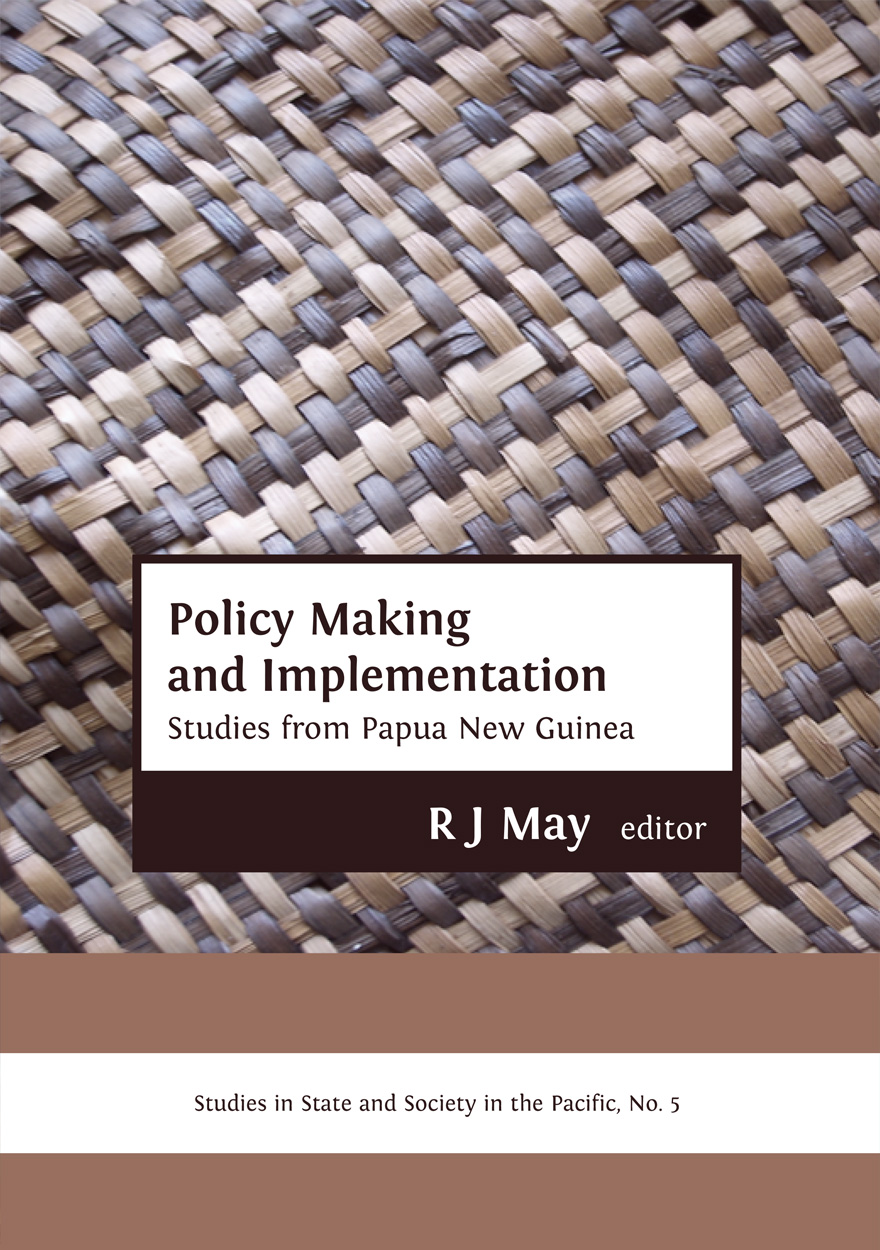
Policy Making and Implementation »
Studies from Papua New Guinea
Edited by: R.J. May
Publication date: September 2009
There is a vast literature on the principles of public administration and good governance, and no shortage of theoreticians, practitioners and donors eager to push for public sector reform, especially in less-developed countries. Papua New Guinea has had its share of public sector reforms, frequently under the influence of multinational agencies and aid donors. Yet there seems to be a general consensus, both within and outside Papua New Guinea, that policy making and implementation have fallen short of expectations, that there has been a failure to achieve ‘good governance’.
This volume, which brings together a number of Papua New Guinean and Australian-based scholars and practitioners with deep familiarity of policy making in Papua New Guinea, examines the record of policy making and implementation in Papua New Guinea since independence. It reviews the history of public sector reform in Papua New Guinea, and provides case studies of policy making and implementation in a number of areas, including the economy, agriculture, mineral development, health, education, lands, environment, forestry, decentralization, law and order, defence, women and foreign affairs, privatization, and AIDS.
Policy is continuously evolving, but this study documents the processes of policy making and implementation over a number of years, with the hope that a better understanding of past successes and failures will contribute to improved governance in the future.

Agenda - A Journal of Policy Analysis and Reform: Volume 16, Number 3, 2009 »
Edited by: William Coleman
Publication date: September 2009
Agenda is a refereed, ECONLIT-indexed and RePEc-listed journal of the College of Business and Economics, The Australian National University. Launched in 1994, Agenda provides a forum for debate on public policy, mainly (but not exclusively) in Australia and New Zealand. It deals largely with economic issues but gives space to social and legal policy and also to the moral and philosophical foundations and implications of policy.
Subscribe to the Agenda Alerting service if you wish to be advised on forthcoming or new issues.
Download for free
Not available for purchase
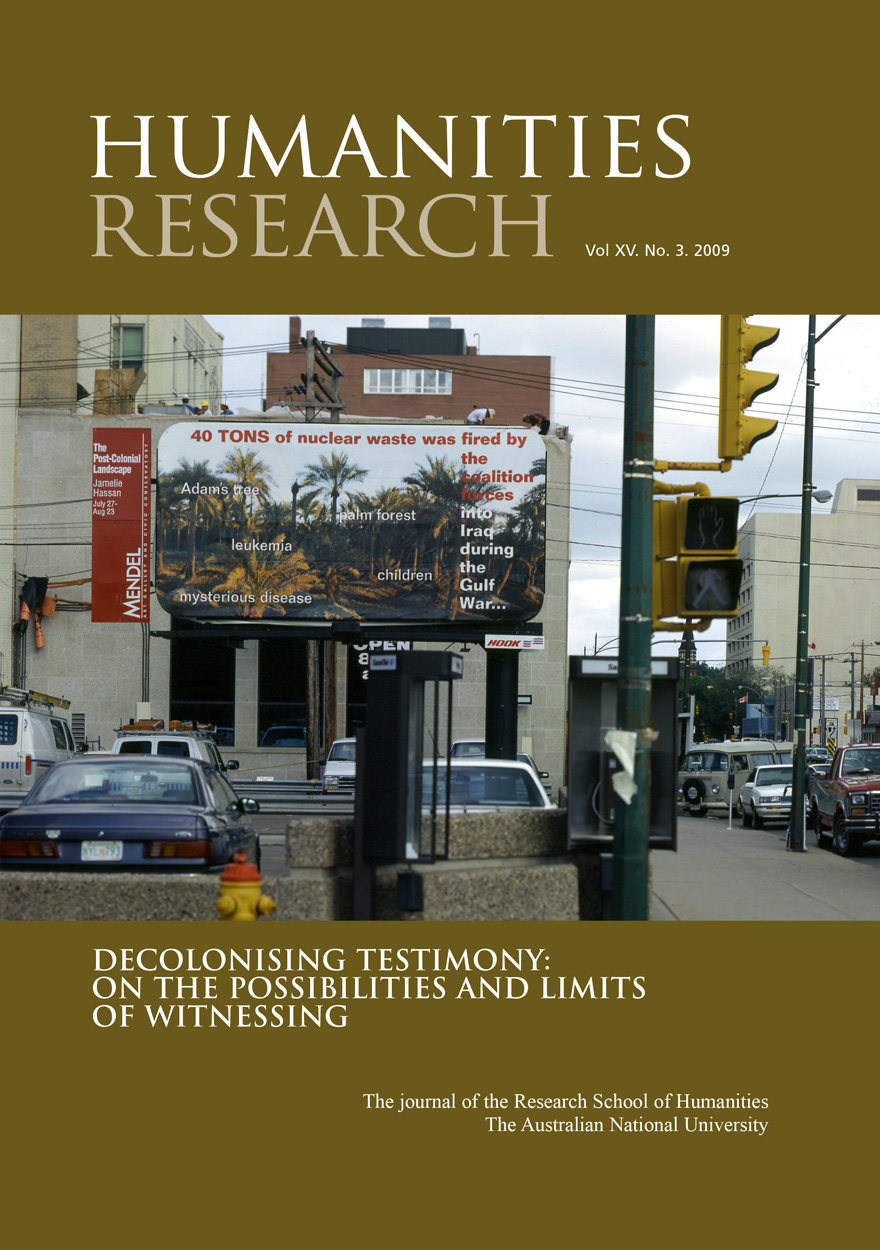
Humanities Research: Volume XV. No. 3. 2009 »
Decolonising Testimony: On the possibilities and limits of witnessing
Edited by: Lynne Bell, Julia Emberley, Rosanne Kennedy
Publication date: September 2009
Humanities Research is an internationally peer-reviewed journal published by the Research School of Humanities at The Australian National University. The Research School of Humanities came into existence in January 2007 and consists of the Humanities Research Centre, Centre for Cross-Cultural Research, National Europe Centre and Australian National Dictionary Centre. Launched in 1997, issues are thematic with guest editors and address important and timely topics across all branches of the humanities.
Download for free
Not available for purchase
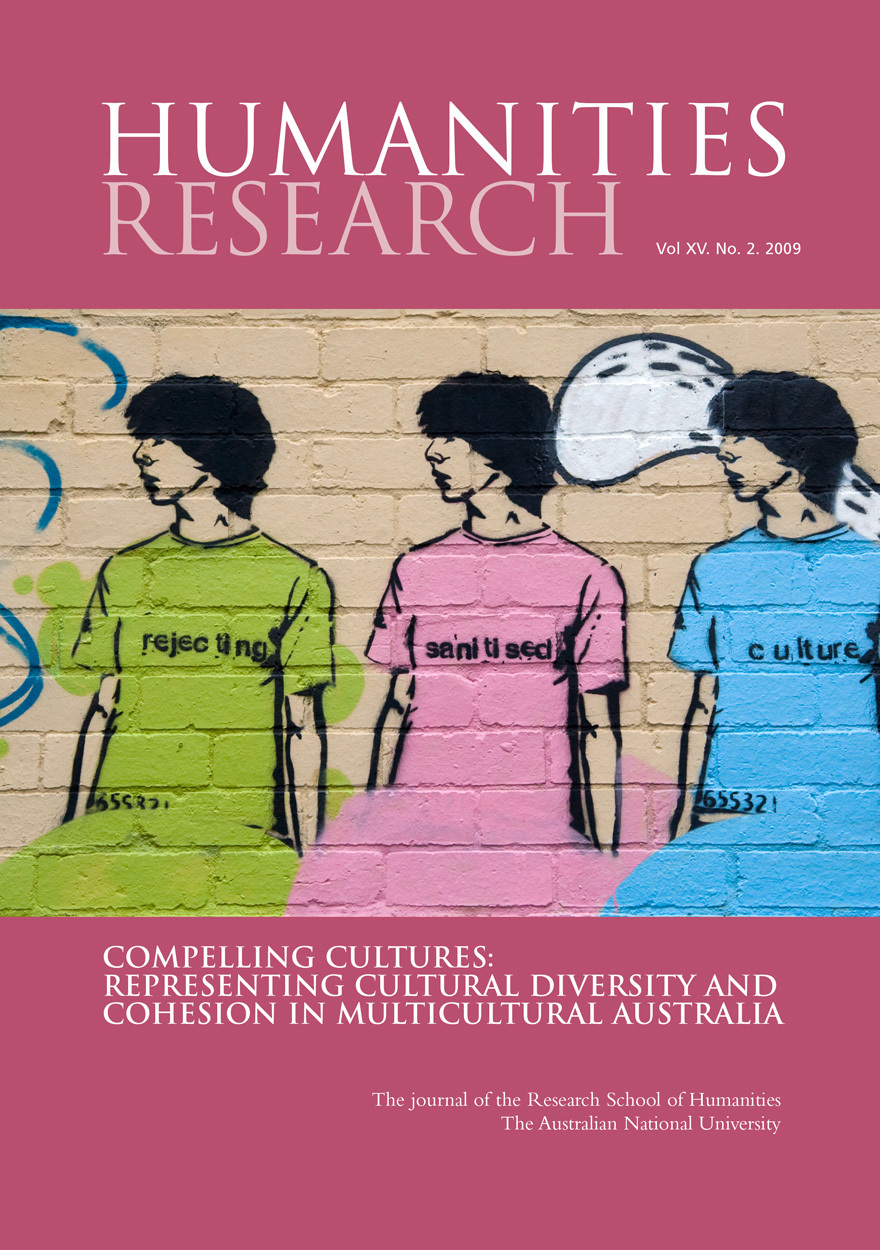
Humanities Research: Volume XV. No. 2. 2009 »
Compelling Cultures: Representing Cultural Diversity and Cohesion in Multicultural Australia
Edited by: Anna Edmundson, Ursula K. Frederick, Kylie Message
Publication date: September 2009
Humanities Research is an internationally peer-reviewed journal published by the Research School of Humanities at The Australian National University. The Research School of Humanities came into existence in January 2007 and consists of the Humanities Research Centre, Centre for Cross-Cultural Research, National Europe Centre and Australian National Dictionary Centre. Launched in 1997, issues are thematic with guest editors and address important and timely topics across all branches of the humanities.
Download for free
Not available for purchase

Food and Agriculture in Papua New Guinea »
Edited by: R. Michael Bourke, Tracy Harwood
Publication date: August 2009
Agriculture dominates the rural economy of Papua New Guinea (PNG). More than five million rural dwellers (80% of the population) earn a living from subsistence agriculture and selling crops in domestic and international markets.
Many aspects of agriculture in PNG are described in this data-rich book. Topics include agricultural environments in which crops are grown; production of food crops, cash crops and animals; land use; soils; demography; migration; the macro-economic environment; gender issues; governance of agricultural institutions; and transport. The history of agriculture over the 50 000 years that PNG has been occupied by humans is summarised. Much of the information presented is not readily available within PNG. The book contains results of many new analyses, including a food budget for the entire nation. The text is supported by 165 tables and 215 maps and figures.

The Making of The Australian National University »
1946-1996
Authored by: Stephen Foster, Margaret Varghese
Publication date: August 2009
The Australian National University has always been a university with a difference. Conceived in the mid–1940s to serve Australia’s post-war needs for advanced research and postgraduate training, it quickly embraced the ideals and traditions of Oxford and Cambridge. Undergraduate teaching was introduced in 1960, following amalgamation with Canberra University College. The University continued to adapt to changes in Australian society, while retaining much of its unique structure and objectives.
Stephen Foster and Margaret Varghese trace the history of ANU from its wartime origins to its fiftieth anniversary in 1996, featuring many of the prominent Australians who contributed to its making: ‘Nugget’ Coombs, Howard Florey, Mark Oliphant, W.K. Hancock, Douglas Copland, John Crawford, Peter Karmel; and others who stood out in particular fields, such as J.C.Eccles, Arthur Birch, Manning Clark, Russell Mathews, Ernest Titterton, Beryl Rawson, John Mulvaney, John Passmore and Frank Fenner.
The Making of The Australian National University explores many themes in higher education during the last half century, including academic freedom, relations between universities and politicians, recruitment practices, the ‘two cultures’ of science and the humanities, collegial versus managerial structures, equality of opportunity, student politics, academics and architecture and universities in the marketplace.
This is an affectionate and critical account of a remarkable Australian institution; and, more broadly, a fascinating study of how institutions work.

Migration and Transnationalism »
Pacific Perspectives
Edited by: Helen Lee, Steve Tupai Francis
Publication date: August 2009
Pacific Islanders have engaged in transnational practices since their first settlement of the many islands in the region. As they moved beyond the Pacific and settled in nations such as New Zealand, the U.S. and Australia these practices intensified and over time have profoundly shaped both home and diasporic communities. This edited volume begins with a detailed account of this history and the key issues in Pacific migration and transnationalism today. The papers that follow present a range of case studies that maintain this focus on both historical and contemporary perspectives. Each of the contributors goes beyond a narrowly economic focus to present the human face of migration and transnationalism; exploring questions of cultural values and identity, transformations in kinship, intergenerational change and the impact on home communities.
Pacific migration and transnationalism are addressed in this volume in the context of increasing globalisation and growing concerns about the future social, political and economic security of the Pacific region. As the case studies presented here show, the future of the Pacific depends in many ways on the ties diasporic Islanders maintain with their homelands.

Research Integration Using Dialogue Methods »
Authored by: David McDonald, Gabriele Bammer, Peter Deane
Publication date: August 2009
Research on real-world problems—like restoration of wetlands, the needs of the elderly, effective disaster response and the future of the airline industry—requires expert knowledge from a range of disciplines, as well as from stakeholders affected by the problem and those in a position to do something about it. This book charts new territory in taking a systematic approach to research integration using dialogue methods to bring together multiple perspectives. It links specific dialogue methods to particular research integration tasks.
Fourteen dialogue methods for research integration are classified into two groups:
Dialogue methods for understanding a problem broadly: integrating judgements
Dialogue methods for understanding particular aspects of a problem: integrating visions, world views, interests and values.
The methods are illustrated by case studies from four research areas: the environment, public health, security and technological innovation.

Power, Culture, Economy »
Indigenous Australians and Mining
Edited by: Jon Altman, David Martin
Publication date: August 2009
Research over the past decade in health, employment, life expectancy, child mortality, and household income has confirmed that Indigenous Australians are still Australia’s most disadvantaged group. Those residing in communities in regional and remote Australia are further disadvantaged because of the limited formal economic opportunities there. In these areas mining developments may be the major—and sometimes the only—contributors to regional economic development. However Indigenous communities have gained only relatively limited long-term economic development benefits from mining activity on land that they own or over which they have property rights of varying significance. Furthermore, while Indigenous people may place high value on realising particular non-economic benefits from mining agreements, there may be only limited capacity to deliver such benefits.
This collection of papers focuses on three large, ongoing mining operations in Queensland, Western Australia and the Northern Territory under two statutory regimes—the Aboriginal Land Rights (Northern Territory) Act 1976 and the Native Title Act 1993. The authors outline the institutional basis to greater industry involvement while describing and analysing the best practice principles that can be utilised both by companies and Indigenous community organisations. The research addresses questions such as:
What factors underlie successful investment in community relations and associated agreement governance and benefit packages for Indigenous communities?
How are economic and non-economic flows monitored?
What are the values and aspirations which Indigenous people may bring to bear in their engagement with mining developments?
What more should companies and government do to develop the capacity and sustainability of local Indigenous organisations?
What mining company strategies build community capacity to deal with impacts of mining? Are these adequate?
How to prepare for sustainable futures for Indigenous Australians after mine closure?
This research was conducted under an Australian Research Council Linkage Project, with Rio Tinto and the Committee for Economic Development of Australia as Industry Partners.
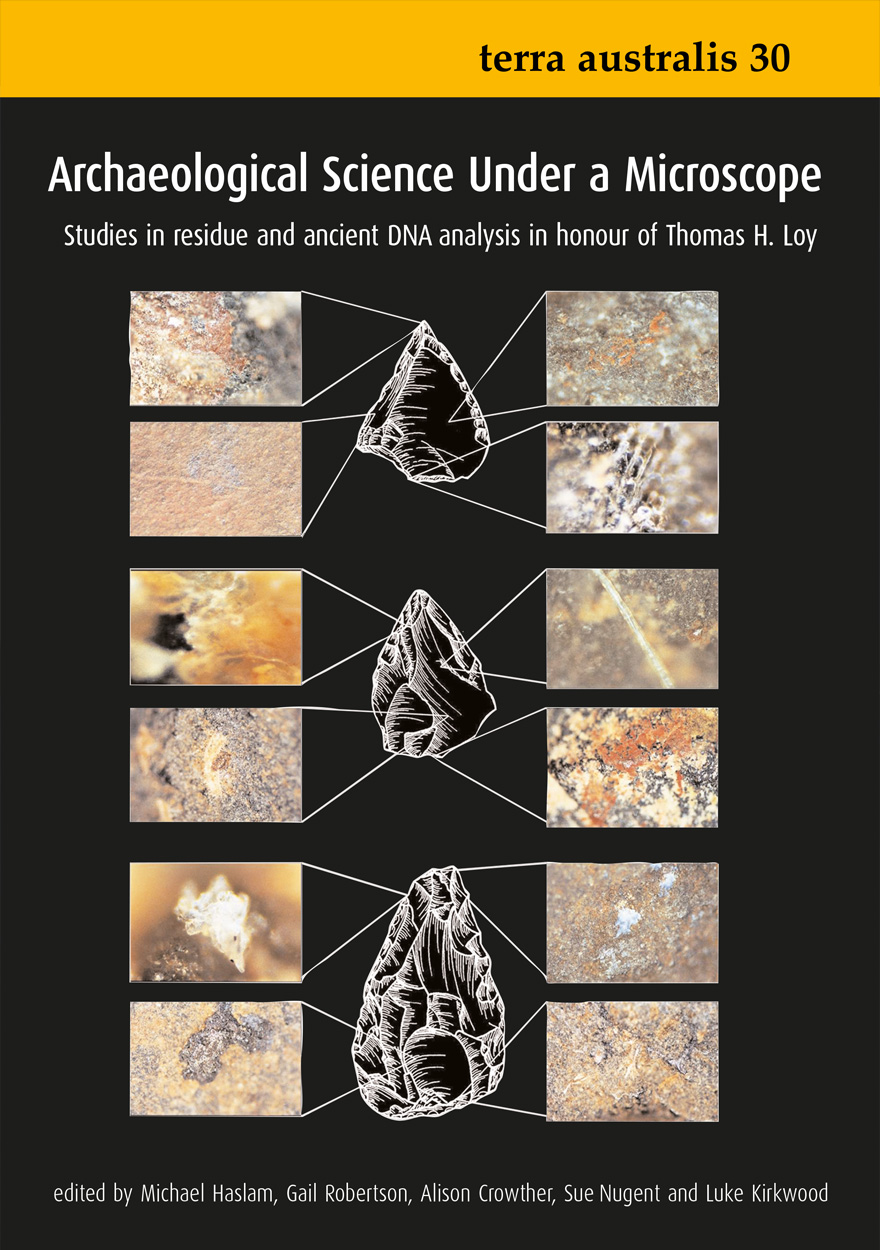
Archaeological Science Under a Microscope »
Studies in Residue and Ancient DNA Analysis in Honour of Thomas H. Loy
Edited by: Michael Haslam, Gail Robertson, Alison Crowther, Sue Nugent, Luke Kirkwood
Publication date: July 2009
These highly varied studies, spanning the world, demonstrate how much modern analyses of microscopic traces on artifacts are altering our perceptions of the past. Ranging from early humans to modern kings, from ancient Australian spears or Mayan pots to recent Maori cloaks, the contributions demonstrate how starches, raphides, hair, blood, feathers, resin and DNA have become essential elements in archaeology’s modern arsenal for reconstructing the daily, spiritual, and challenging aspects of ancient lives and for understanding human evolution. The book is a fitting tribute to Tom Loy, the pioneer of residue studies and gifted teacher who inspired and mentored these exciting projects.

China's New Place in a World in Crisis »
Economic, Geopolitical and Environmental Dimensions
Edited by: Ross Garnaut, Ligang Song, Wing Thye Woo
Publication date: July 2009
The world and China’s place in it have been transformed over the past year. The pressures for change have come from the most severe global financial crisis ever. The crisis has accelerated China’s emergence as a great power. But China and its global partners have yet to think or work through the consequences of its new position for the governance of world affairs. China’s New Place in a World in Crisis discusses and provides in-depth analysis of the following questions. How have China’s growth prospects been affected by the global crisis? How will the crisis and China’s response to it impact China’s major domestic issues, such as industrialisation, urbanisation and the reform of the state-owned sector of the economy? How will the crisis and the international community’s response to it affect the rapidly emerging new international order? What will be China’s, and other major developing countries’, new role? Can China and the world find a way of breaking the nexus between economic growth and environmental sustainability — especially on the issue of climate change?

Oceanic Encounters »
Exchange, Desire, Violence
Edited by: Margaret Jolly, Serge Tcherkézoff, Darrell Tryon
Publication date: July 2009
This volume, the result of ongoing collaborations between Australian and French anthropologists, historians and linguists, explores encounters between Pacific peoples and foreigners during the longue durée of European exploration, colonisation and settlement from the sixteenth century to the twentieth century. It deploys the concept of ‘encounter’ rather than the more common idea of ‘first contact’ for several reasons. Encounters with Europeans occurred in the context of extensive prior encounters and exchanges between Pacific peoples, manifest in the distribution of languages and objects and in patterns of human settlement and movement. The concept of encounter highlights the mutuality in such meetings of bodies and minds, whereby preconceptions from both sides were brought into confrontation, dialogue, mutual influence and ultimately mutual transformation. It stresses not so much prior visions of ‘strangers’ or ‘others’ but the contingencies in events of encounter and how senses other than vision were crucial in shaping reciprocal appraisals. But a stress on mutual meanings and interdependent agencies in such cross-cultural encounters should not occlude the tumultuous misunderstandings, political contests and extreme violence which also characterised Indigenous-European interactions over this period.
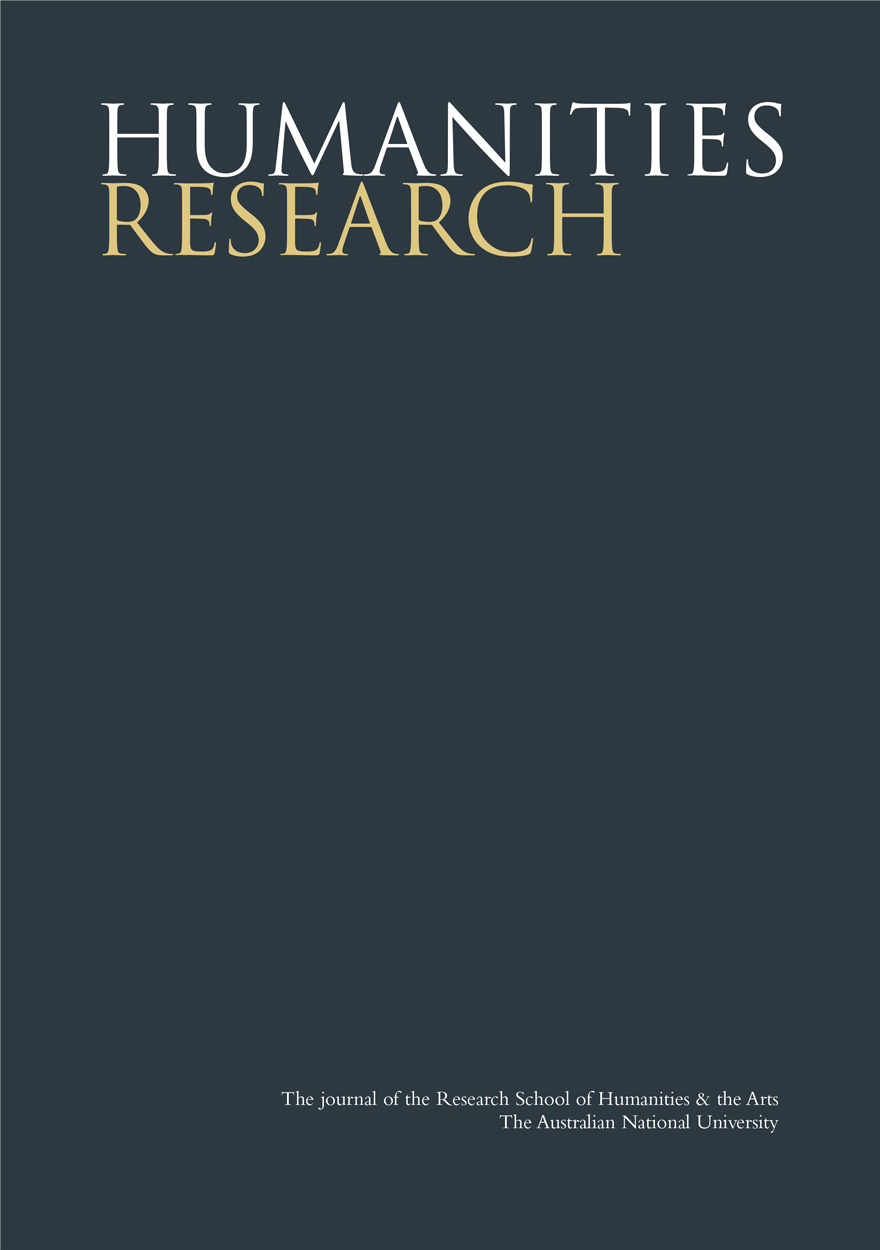
Humanities Research Journal Series: No. 1. 2000 »
Publication date: July 2009
Humanities Research is an internationally peer-reviewed journal published by the Research School of Humanities at The Australian National University. The Research School of Humanities came into existence in January 2007 and consists of the Humanities Research Centre, Centre for Cross-Cultural Research, National Europe Centre and Australian National Dictionary Centre. Launched in 1997, issues are thematic with guest editors and address important and timely topics across all branches of the humanities.
Download for free
Not available for purchase



